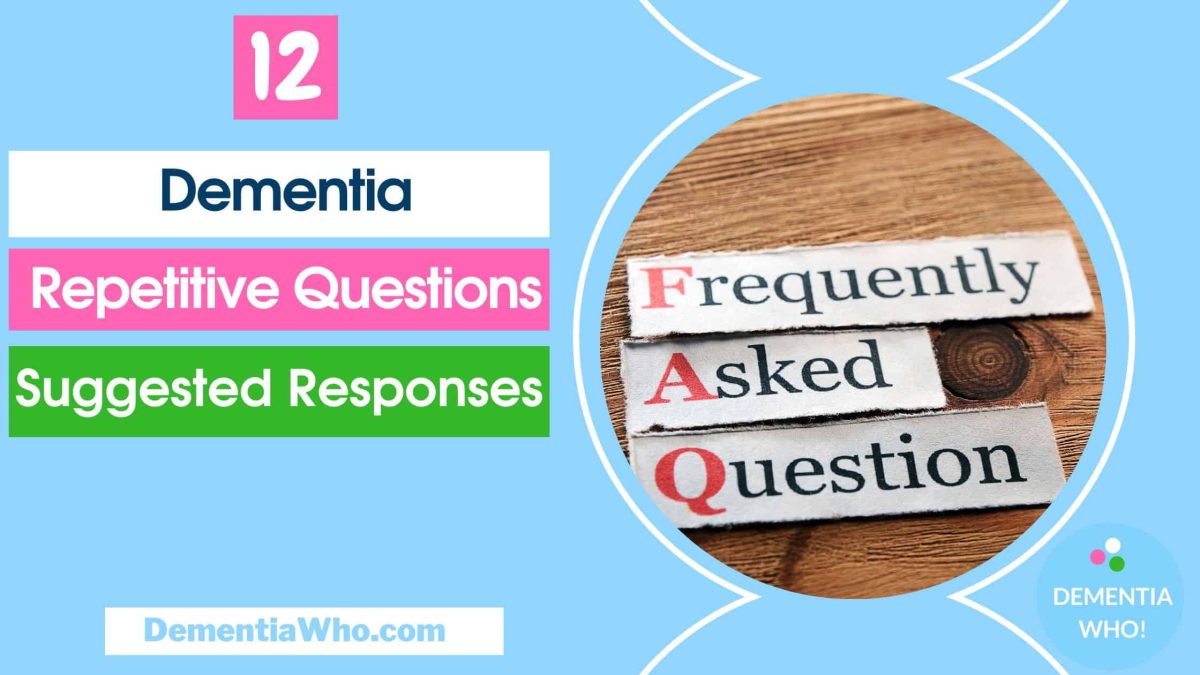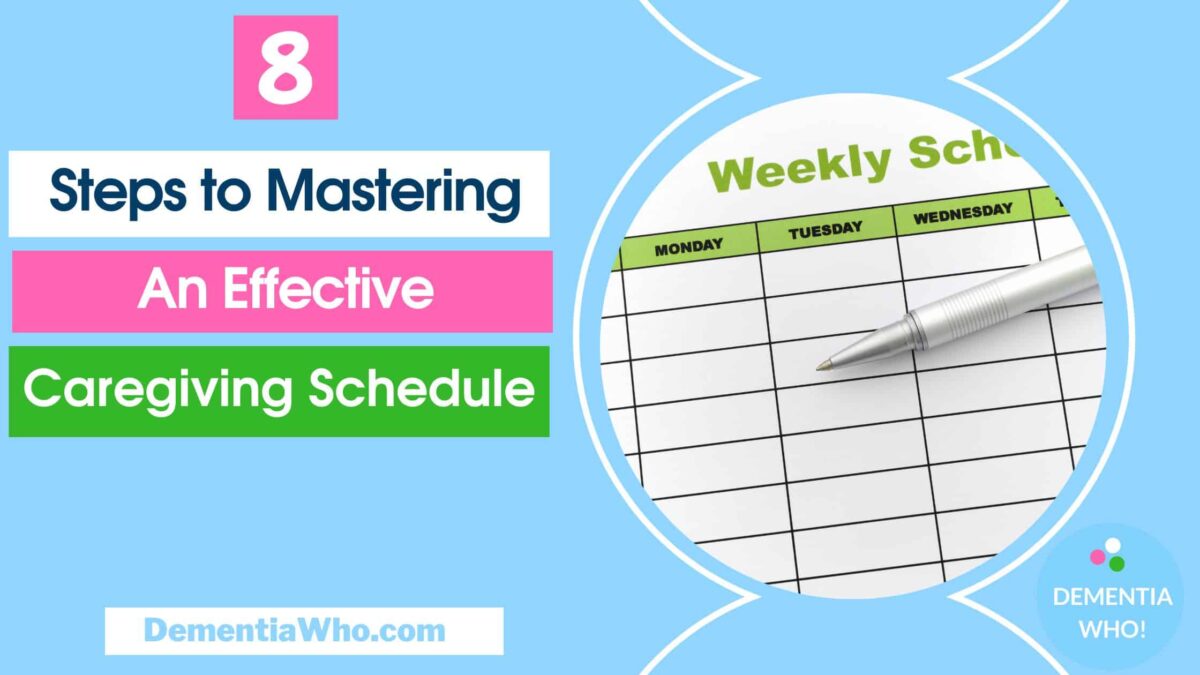When caring for someone with dementia, it’s important to anticipate and, if possible, prepare for the repetitive questions that may arise. This article focuses on giving you 12 dementia repetitive questions and suggested responses to answer questions such as below.
Learn the things to look out for – identifying root causes, how to handle underlying needs, and how to respond to these questions
“What time is it?”
“When are we going home?”
“Where is my purse?”
How many times a day do you hear that from a loved one with dementia? Do you feel like pulling your hair out, shouting, walking away and more? I know how you feel, but we can’t do that!
Instead, we need to recognize that your loved one isn’t intentionally trying to annoy or irritate anyone. In fact, the truth is that your loved one is probably in some form of distress. If you’ve explored the underlying need or root cause and tried to address that but you still need help on how to respond then, read on. Let me know in the comments if you found it helpful.
Here are the 12 dementia repetitive questions and suggested responses to help distract your loved one from a repetitive loop.
! Note: it’s important to try to address the underlying need and understand why they are repeating these questions. So, if you haven’t read them yet, check out these two preceding articles on handling repetitive questions in dementia!
Related:
Why Does My Mum With Alzheimer’s Keep Repeating Herself?
Strategies for Handling Repetitive Questions in Dementia

So let’s get on with it. Here is my list of frequently asked repetitive questions from a loved one living with dementia.
“What time/day is it today?”
Suggested Responses:
“It’s Monday, a great day for our morning walk. Would you like to go to the park or go to the shops?”
“Today is Monday, the day we usually do some gardening. How about we check on the flowers we planted?”
If that doesn’t work: Create a visual daily schedule with pictures representing different activities, including their current favourite interests, to help them visualize how the day will progress.
Encourage them to check it themselves.
Engage in an activity unrelated to the day of the week, like listening to music or a simple art project, to distract and engage. Consider if it’s less about knowing the time and more about uncertainty or anxiety about upcoming events.
“When Are We Going Home?”
Suggested Responses:
“We are at home, where we have all our things. Let’s find our favourite book and read together.”
“This is our home, filled with love. How about we make it cosier by arranging these flowers?”
If that doesn’t work: Try engaging them in a familiar activity that makes them feel at home, like setting the table for dinner or looking through family photos, to create a sense of normalcy and security.
Create a space within the home that feels more ‘home-like’ to them, such as setting up a comfort corner with their favourite chair and comfort items, foot stool, etc.
“Why Can’t I Find My Purse?”
Suggested Responses:
“Let’s look for it together after we finish this crossword puzzle. It might just pop into your mind where it is.”
“I’ll help you look for it in a bit. Let’s enjoy this cup of tea and relax for now.”
If that doesn’t work: Use the search as an opportunity for a short walk or activity change, ensuring safety and engagement without focusing solely on the missing item.
“Did I Lock The Door?”
Suggested Responses:
“I checked, and it’s all locked. You’re safe. Now, let’s decide on what you’d like to do next? Would you prefer to watch tv or finish your knitting project together?”
“Yes, everything is safe. How about we make a safety checklist together for fun? We can use it every day then to check everything is all locked up!”
If that doesn’t work: Perform a ‘safety check’ using the checklist together as an engaging activity, providing reassurance and a sense of control.
“Have I Eaten Breakfast?”
Suggested Responses:
“Yes, we had breakfast. You enjoyed your favourite toast. Now it’s time for our next adventure. How about we do some painting?”
“We did, and you finished your coffee, too. Let’s see what we have planned for today? Shall we do some painting?”
If that doesn’t work: Prepare a small, healthy snack to reassure them, and transition to discussing favourite foods, looking up recipes or talking about a cooking activity.
“What Are We Doing Today?”
Suggested Responses:
“We have some exciting plans ahead! Let’s start by choosing a fun activity. Would you like to do some painting or maybe go for a short walk?”
“We’re going to bake some cookies. Would you like to help me get the ingredients ready?”
If that doesn’t work: Introduce a variety of activities to find one that engages them, they may be bored. Initiate a familiar routine or activity that they enjoy, such as looking through old photos or watching a favourite movie, to provide structure and reassurance.
“Where Is My Mother/Father/Spouse?”
Suggested Responses:
“Your mother was a wonderful person; I bet you have some great stories about her. What was your favourite thing to do together?”
“Could you help me by folding these towels? I really appreciate your help.”
If that doesn’t work: Shift focus to a comforting activity or ask for help with practical task like laundry or pull out a memory box to reminisce.
“I Have A Doctor’s Appointment Today”
Suggested Responses:
“No appointments for you today. I’ll need to check when you have one, but for now let’s make today special by creating something beautiful. Painting or gardening?”
“Your day is free today. We could use this time for something enjoyable. Would you like to go for a walk or watch your favourite program?”
If that doesn’t work: Discuss what they like or dislike about doctor visits to address underlying anxiety, using the conversation to segue into a comforting activity.
Ask if they feel any pain and why they need to see the doctor. Reassure them that all is well, and we’ll make an appointment in the future if they become unwell.
“Who Are You?”
Suggested Responses:
“I’m [Your Name], someone who cares a lot about you. Let’s do something fun together.”
“I’m here to spend some good time with you. Would you like to go for a walk or do some gardening?”
If that doesn’t work: Use familiar objects or photos to help them feel more secure and connected, gently guiding the conversation to familiar topics.
Sundowning can increase confusion about familiar faces, offer them something comforting and familiar, like a favorite blanket, reassure through your presence.
“Did I Pay The Bills?”
Suggested Responses:
“Yes, everything is taken care of. Now, let’s focus on something relaxing. Would you like to listen to some soothing music or do some gentle stretching?”
“You took care of the bills earlier. How about we take a break and enjoy a cup of tea and a biscuit together?”
If that doesn’t work: Redirect their attention to a calming or enjoyable activity, such as a short nature walk or practicing deep breathing exercises, to help alleviate any lingering anxiety or worry.
“Is It Time For My Medication?”
Suggested Responses:
“We took your medication a little while ago. No need to worry about that. Would you like to listen to some music or work on an embroidery?”
“We already took your medication earlier. How about we make a something to eat together?”
If that doesn’t work: Offer a comforting activity or sensory experience to distract from the focus on medication, such as calming hand massage, painting nails etc
“Is It Time To Go To Bed?”
Suggested Responses:
“It’s still early. How about we watch your favourite show or listen to some music before bedtime?” “Not yet. We have some time. Let’s use it to talk about what we did today and what we’re looking forward to tomorrow.”
If that doesn’t work: Reassure them that bedtime will be soon but, in the meantime, engage in quiet, calming activities that naturally transition towards bedtime, like dimming the lights and reading a book together.
Hope this help, let me know in the comments, but remember when responding to repetitive questions try to provide empathy and reassurance. By using the same or similar responses each time, you can establish familiarity and provide a sense of security for your loved, offering reassurance and empathy to help reduce anxiety and improve communications.
I hope you find these 12 dementia repetitive questions and suggested responses useful.
Ps- Don’t forget to LIKE and give me some feedback. Thanks!












Thank you, these answers were really helpful. Pat
Great to know. Thank you